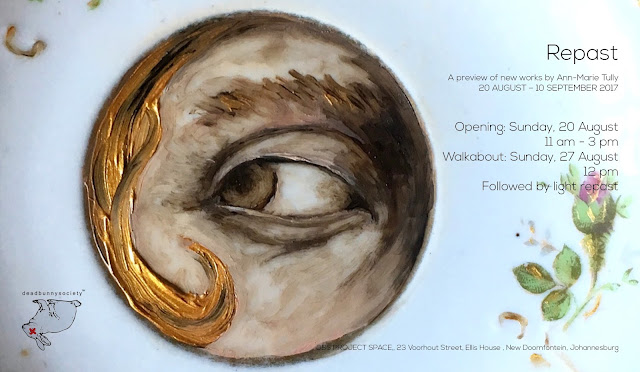The overarching title of these works, ‘Picking Bones’ refers to a body of work that employs bone china crockery - associated with the decorative and culinary arts - as a oil painting substrate. The title, ‘Picking Bones’ stems from the English Idiom, ‘I have a bone to pick with you', meaning that there is a matter, or ‘bone of contention’ to be dealt with. The reference to bones also refers to the use of bone ash in the bone china slurry; while also being a reference to the mix of antiquated subject matter: mythological, classical, cultural, and historical - depicted in a linear fashion on the up-cycled ceramic relics. The word ‘picking’ can be construed as a reference to the appropriation of iconography from sources ranging through the classical and art historical, photographic sources, and much else. The rendering of these ‘grand narratives’ on quotidian wares is an ironic gesture that transforms the ‘grand’ to decorative, and the quotidian to art.
 |
Ann-Marie Tully, Picking Bones: Grindley Mummy (Egypt). Oil on bone china (Grindley).
420 (H) x 325 (W) mm
|
 |
Ann-Marie Tully, Picking Bones: The Burleigh Aphrodite. Oil on bone china (Burleigh).
390 (H) x 325 (W) mm
|
 |
Ann-Marie Tully, Picking Bones: Cupid & Psyche. Oil on bone china (Mintons). 390 (H) x
325 (W) mm.
|
 |
Ann-Marie Tully, Picking Bones: Cupid & Psyche. Oil on bone china (Mintons). 390 (H) x
325 (W) mm
|
 |
Ann-Marie Tully, Picking Bones: Leda’s swan on Rosa (After da Vinci). Oil on bone china
(Rosa). 390 (H) x 325 (W) mm
|
 |
Ann-Marie Tully, Picking Bones: Persephone’s Return. Oil on bone china. 315 (H) x
400 (W) mm
|
 |
Ann-Marie Tully, Picking Bones: The Sleep of Nyx. Oil on bone china. 350 (H) x 210 (W) mm
|
 |
Ann-Marie Tully, Served on a platter: Nike Samathrace incognito. Oil on silver tray. 390 (H)
x 325 (W) mm
|
 |
Ann-Marie Tully, Served on a platter: Grace, Grainne, Graziana. Oil on bronze platter.
390 (H) x 325 (W) mm
|
 |
Ann-Marie Tully, Served on a platter: Grace, Grainne, Graziana. Oil on bronze platter.
390 (H) x 325 (W) mm
|
 |
Installation view @ Knysna Fine Art
|
The title and subjects of the below works, ‘Kore’ is related to the Greek word for ‘maiden’. It is also the name given to a type of free-standing sculpture of Greek antiquity depicting female figures. ‘Kouros’ are the male equivalent. Both gender examples exhibit an often stiff and upright countenance, and what has been called an ‘archaic smile’. The male figures are mostly nude, while the female ‘kore’ figures are often depicted dressed in ornate drapery and braided hairstyles. My ‘kore’ studies draw their iconography from a more recent Greek artist: Vasso Katrakis (1914 - 1988). Katrakis was known for her unique engravings and contemporary Hellenic style; as well as her anti-war and anti-fascist activism. Her subject-matter ranged through engravings of everyday people and landscapes, to socio-politically charged representations of the difficulties of the Greek people in the postwar period. Her midcentury representations of young Greek men and women are particularly striking in my mind - exhibiting an exceptional control of line and physical expression. These ‘Kore’ are my homage to this exceptional Greek woman and artist. The rendering of these ‘visual nods’ on china and ceramic platters, and trays can be viewed and an ironic gesture that transforms the ‘grand’ to decorative, and the quotidian to art. These works were part of the exhibition accompanying the annual George Bizos Bursary Fundraiser at Saheti School Johannesburg.
 |
Ann-Marie Tully, Picking Bones: Kore (After Vasso Katrakis) I. Oil on ceramic. 350 (H) x
270 (W) mm |
 |
| Ann-Marie Tully, Picking Bones: Kore (After Vasso Katrakis) III. Oil on silver tray. 400 (H) x 300 (W) mm |
 |
Ann-Marie Tully, Picking Bones: Kore (After Vasso Katrakis) II. Oil on ceramic. 340 (H) x
290 (W) mm
|
 |
| Installation view @ George Bizos Bursary Fundraiser, Saheti School |



























































